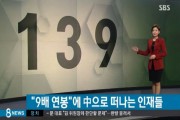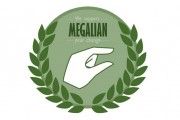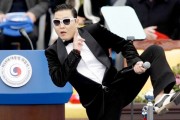A law designed to combat indecent exposure and drunken abuse of the police has led to much speculation as to whether or not miniskirts will be deemed illegal once the law comes into effect today.
The law was passed a year ago, under the last administration, but left-leaning newspaper the Hankyoreh argues the legislation sets an ‘authoritarian’ and ‘regressive’ tone for the new president.
The problem, critics argue, is the ambiguity of the new law that says ‘those who show their bare skin excessively in a public place or expose parts of the body that should remain covered, thus making others feel embarrassment or discomfort, are guilty of indecent exposure.’
Under Park Chung-hee’s dictatorship in the 1970s, women could not wear skirts shorter than a government-approved length. Men also could not grow their hair longer than a certain length, leading to situations where the police would grab long-haired men on the street and shave them.

The fact that Park Geun-hye is the daughter of the former ‘strongman’ has inevitably led the press to make comparisons between father and daughter’s rule.
The law is also designed to punish people who abuse the police when under the influence of alcohol, but critics allege the new legislation gives law-enforces too much power.
From the Hankyoreh:
New law gives fines for indecent exposure, begging
‘The first session of the National Assembly under the new Park Geun-hye administration has started a controversy with new measures for the enforcement of the criminal code passed in March of 2012. Lawmakers claim the law has been ‘abused’, as it continues to impose penalties for crimes reminiscent of past eras, noticeably indecent exposure and breaking the government-imposed curfew. Critics say the new law allows for even easier arrest and prosecution of these crimes. Koreans have become more uneasy given the family history of the new president, as many of the controversial laws were emblematic of the Park Chung-hee era.
20th Century Crimes in the 21st Century
A penalty for ‘indecent exposure’ has attracted the most attention, as it would fine anyone convicted of the crime ₩50,000. According to the wording of the new law, set to come into force on the 22nd of March, 2013, ‘anyone who shows their bare skin excessively in a public place or exposes parts of the body that should remain covered and gives feelings of embarrassment or discomfort to other people’ would be guilty of indecent exposure.The wording of the new law dropped the clause forbidding “clothing which is transparent’. Police have explained that ‘the objective of the law is not to prohibit miniskirts’, but since the standard of ‘parts of the body that should remain covered’ is ambiguous, there is concern that it could lead to subjective applications of the law whenever a police officer personally feel it is appropriate.
Other clauses in the law stand out for their possible misuse. Among the laws which can be punished with ‘a fine of up to ₩100,000 or imprisonment’ are ‘obstructing the activities or beliefs of a group or an individual through malicious acts’. The definition of a ‘malicious act’ seems to also be quite vague and has been criticised for its possible misuse.
When police charge an individual with committing a crime, if the individual lacks any personal identification and refuses to undergo a fingerprint test, police can give them additional punishment. Human rights organizations could bring charges of human rights violations against police who force someone to give up physical evidence from their body.
New Laws Target ‘Weaker Members of Society’
 Abuse the police? That’s a fine
Abuse the police? That’s a fine
‘New laws also provide police with the ability to quickly arrest and charge individuals who have drunkenly vandalised police buildings or other public buildings. The reformed criminal code states that ‘individuals under the influence of alcohol who use vulgar language or are abusive within public buildings may be fined up to ₩600,000 or face imprisonment’.
‘A new clause stating that ‘individuals who have been fined less than ₩500,000 but who have a place of residence may not be imprisoned’ seems to want to circumvent the current law and has a ‘creepy’ intention. Oh Chang-ik of the Human Rights Coalition criticised the new lay, saying that, ‘it has long been the privilege of the police to show their irritation to anyone causing trouble inside of a police station, the new law turns this privilege into a legally protected right.’ In response, a spokesmen for the police said that ‘the objective of the law is to prevent certain crimes before they occur.’
‘The new law also specifies penalties for “people who obstruct movement in public places or irritate others through begging in public areas.’ Previously, the law only penalised those individuals who forced others to beg, beggars themselves will now become the target of prosecution. The extremely poor individuals who make their living from begging in the subway stations can now be fined up to ₩100,000.
 Refuse to help a government employee? That’s a fine
Refuse to help a government employee? That’s a fine
In addition, it is now illegal to refuse to help a government employee who requests help. People who ‘refuse a request for help from a government employee during a disaster, fire, traffic accident, crime, or other sudden incident without appropriate reason despite being in close proximity’ can be fined up to ₩100,000.
Politicians must clean up their mess
The 19th National Assembly should reform and strongly consider abolishing the the new criminal code that the 18th National Assembly passed without appropriate review or self-reflection.
Hong Sungsoo, a professor of law at Sookmyung Women’s University, offered the criticism, ‘the content of the new criminal code overlaps with much of the current body of law. A civil suit or administrative measure would be sufficient to impose discipline. [Reform of the law] has only increased concerns about misuse of police power. We shouldn’t be considering just reform of the law, rather abolishment in its entirety.’
Lee Sang-kyu, member of the National Assembly and the United Progressive Party, stated that ‘the new criminal code was rushed through the legislative process far too quickly. We need to have a complete review of the entire code.’
Singer Lee Hyori commented on the new law:
@frog799: Are they really going to fine people for indecent exposure?? Well, I’m in trouble
Comments on Twitter:
홍성수 @sungsooh:
Talk about penalties for indecent exposure will only incite ridicule and anger. But after I hear the police’s explanation… This is a problem that should be addressed with insight and care, not attacked with a crude response, as with all problems. I say it again, the real problem is that the criminal code exists at all
최광희 @cinemAgora:
In the future, indecent exposure with be published with a ₩50,000 fine. No, this is not a repeat of news about the crackdown on miniskirts in the 1970s. This is a law that appeared during Park Geun-hye’s first session of the National Assembly. history repeats itself
성재기 @sungjaegi:
Did you think that men and women had equal equal rights to sexual expression? If an erection indicates that a man is aroused, what is the indication for a woman? I believe that exposing themselves is how women show their arousal. Exposure can be thought of as a woman’s erection. Just as you must be careful not to show off an erection in certain places, you should also be careful about showing skin in certain places
백찬홍 @mindgood:
Fines for indecent exposure? In Germany, a lingerie company was able to put up this ad, announcing a sale where customers could exchange their used lingerie for new ones. Prime Minister Merkel is even shown wearing a bikini. This is the essence of a democracy.
선대인 @kennedian3:
[Indecent exposure, ₩50,000. Stalking, ₩80,000. Scalping tickets, ₩160,000] So this is what Park Geun-hye was talking about when she mentioned a society ‘ruled by laws’. She focuses on petty crimes to arrest ordinary citizens and ignores the tax evasion practiced by chaebol chairmen and bureaucrats.
이외수 @oisoo
In regards to the recent controversy over fines for indecent exposure, the only change in the new law is from the immediate indictment process used earlier to a delayed procedural process. Actually, the punishment has been reduced from a court trial, ₩100,000 fine and minimum 30 days in jail to just a ₩50,000 fine. So, this actually isn’t a crackdown on anything. Please take a deep breath
하상욱 @TYPE4GRAPHIC
For a limited time until the law comes into effect, it is completely free to expose yourself! Hurry and take advantage of this deal!!
독설닷컴 @dogsul
This seems like the best coverage from today’s editorials.. RT @ktazo: The worst kind of exposure is that which the media gives to Park Geun-hye on their front pages, the worse kind of stalking is surveillance of civilians!
Comments from the Hankyoreh:
이순신:
Why do young people these days complain so much and get suspicious of everything? Do you think street protests and demonstrations are the same thing as democracy, or that it makes you the intelligentsia? Does justice amount to nothing more than distrusting the government and cursing the president? You cry for cheaper tuition, saying ‘it’s the government’s fault!’, ‘it’s the older generation’s fault!’ Then you get together in after-school clubs to drink and ignore your studies
이순신:
What the hell does this law have to do with you? Do you think that all of the trash you read on the internet, in SNS, or hear through rumor is the absolute truth? So the government controls everything and everyone in power and manipulates everything through conspiracies?
감성보단이성:
So, Hankyoreh, then what are we supposed to do about people like that who cause trouble and act in such an objectionable way? When you criticise the government you should at least provide an alternative and not just whine like a child who has hurt feelings. Don’t you know how hard it is for the police to deal with drunken disorderly conduct? Do you even read your own articles? Hmm?
전탱크:
Wow, our local red newspaper has some nerve..
초컬렛:
The Hankyoreh is just trying to stir up libelous attacks! Don’t fall for this propaganda











